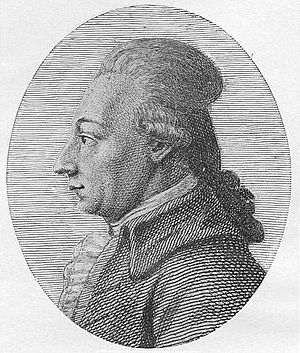Friedrich August Wolf facts for kids
Friedrich August Wolf (born February 15, 1759 – died August 8, 1824) was an important German scholar. He studied ancient Greek and Roman cultures. Many people see him as the person who started the modern study of "philology."
Philology is a special field that looks at human language and literature, especially from old times. It helps us understand ancient cultures through their writings and history.
Contents
Life Story
Early Life and Education
Friedrich August Wolf was born in a small village called Hainrode, near Nordhausen, Germany. His father was the local school teacher and played the organ for the church.
From a young age, Wolf was very smart. At grammar school, he learned many languages. These included Latin and Greek, which were very important for studying ancient times. He also learned French, Italian, and Spanish. Besides languages, he also studied music.
University Years
When he was 18, in 1777, Wolf went to the University of Göttingen. He had already studied on his own for two years. A famous story says that he wanted to study "philology" there. However, the university did not have a department for it at the time. Still, they accepted his request.
At Göttingen, a professor named Christian Gottlob Heyne was teaching. He did not let Wolf attend his classes. Heyne also disagreed with Wolf's ideas about the ancient Greek poet Homer. But Wolf did not give up. He continued his studies by using the university's large library.
Teaching and Professorship
From 1779 to 1783, Wolf worked as a teacher. He taught in places like Ilfeld and Osterode. During this time, he also published his own version of Plato's Symposium, an ancient Greek book.
In 1783, Wolf became a professor at the University of Halle in Prussia. This was a big step in his career.
Developing Philology
Wolf spent many years in Halle (1783–1807). With support from ministers working for Frederick the Great, he developed his ideas about "philology." He defined philology as studying human nature as seen in ancient times.
He believed that to understand ancient cultures, you needed to look at many things. This included their history, writings, art, and other examples of their life. He thought that studying history and language together was key. He created a special program at Halle called a seminarium to teach these ideas.
While at Halle, Wolf published important works. One was a commentary on Leptines by Demosthenes (1789). This book influenced his student Philipp August Böckh. He also published Prolegomena ad Homerum (1795). This book caused some arguments, as Heyne accused him of copying ideas.
Later Years and Legacy
Wolf's time as a professor at Halle ended after the French invasion in 1806. He then moved to Berlin. There, he received help from Wilhelm von Humboldt, another important scholar.
Later, he became a professor again. However, he did not have the same success as before. He also wrote much less. His most complete work, Darstellung der Alterthumswissenschaft, was published in Berlin in 1807. But the ideas in it mostly came from his time in Halle.
Wolf later traveled south for his health. He passed away on the way to Marseille and was buried there. In 1840, a special medal was made to honor him.
See also
 In Spanish: Friedrich August Wolf para niños
In Spanish: Friedrich August Wolf para niños
Images for kids
 | Anna J. Cooper |
 | Mary McLeod Bethune |
 | Lillie Mae Bradford |



